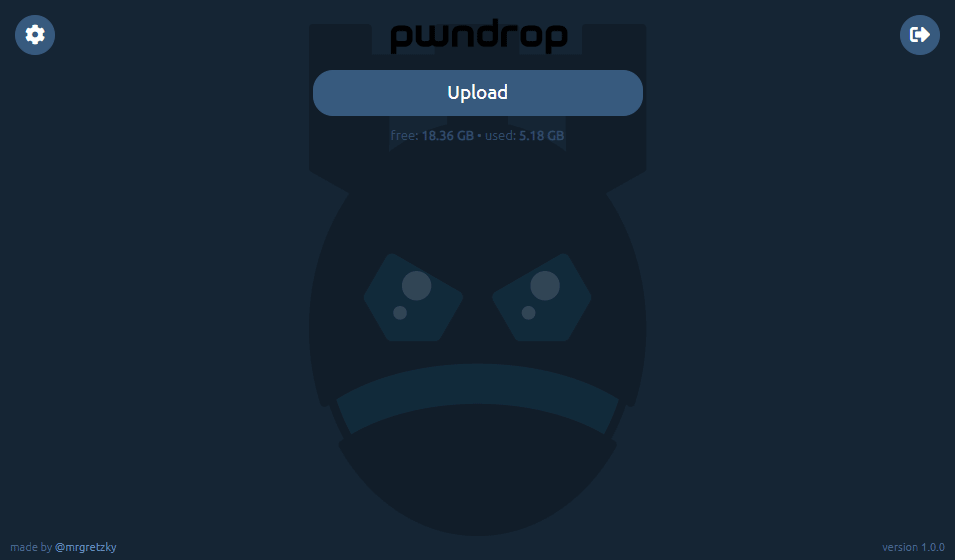https://github.com/kgretzky/pwndrop
Self-deployable file hosting service for red teamers, allowing to easily upload and share payloads over HTTP and WebDAV.
https://github.com/kgretzky/pwndrop
file-manager file-sharing http-server payloads redteam self-hosted webdav-server
Last synced: 7 months ago
JSON representation
Self-deployable file hosting service for red teamers, allowing to easily upload and share payloads over HTTP and WebDAV.
- Host: GitHub
- URL: https://github.com/kgretzky/pwndrop
- Owner: kgretzky
- License: gpl-3.0
- Created: 2019-11-28T19:06:30.000Z (about 6 years ago)
- Default Branch: master
- Last Pushed: 2023-02-25T05:08:15.000Z (almost 3 years ago)
- Last Synced: 2025-04-11T02:51:55.651Z (8 months ago)
- Topics: file-manager, file-sharing, http-server, payloads, redteam, self-hosted, webdav-server
- Language: JavaScript
- Homepage: https://breakdev.org/pwndrop
- Size: 7.46 MB
- Stars: 2,121
- Watchers: 45
- Forks: 267
- Open Issues: 44
-
Metadata Files:
- Readme: README.md
- Changelog: CHANGELOG.md
- Funding: .github/FUNDING.yml
- License: LICENSE
Awesome Lists containing this project
- awesome-hacking-lists - kgretzky/pwndrop - Self-deployable file hosting service for red teamers, allowing to easily upload and share payloads over HTTP and WebDAV. (JavaScript)
- venom - `pwndrop` - Self-deployable file hosting service for red teamers, allowing to easily upload and share payloads over HTTP and WebDAV. (Datastores)
- awesome-rainmana - kgretzky/pwndrop - Self-deployable file hosting service for red teamers, allowing to easily upload and share payloads over HTTP and WebDAV. (JavaScript)
README


**pwndrop** is a self-deployable file hosting service for sending out red teaming payloads or securely sharing your private files over HTTP and WebDAV.
If you've ever needed to quickly set up an nginx/apache web server to host your files and you were never happy with the limitations of `python -m SimpleHTTPServer`, **pwndrop** is definitely for you!

With **pwndrop** you can:
- [x] Upload and immediately share multiple files using your own private VPS, using drag & drop.
- [x] Decide to make files available or unavailable for download with a single click.
- [x] Set up custom download URLs, for shared files, without playing with directory structure.
- [x] Set up facade files, which will be served instead of the original file whenever you feel like it.
- [x] Set up automatic redirects to spoof the file's extension in a shared link.
- [x] Change MIME type of the served file to change browser's behavior when a download link is clicked.
- [x] Serve files over HTTP, HTTPS and WebDAV.
- [x] Install and setup everything using a bash oneliner.
- [x] Set up **pwndrop** to work as a nameserver and respond with a valid DNS A record to any sub-domain you choose.
- [x] Protect your admin panel behind a custom secret URL path and log in securely with your own username and password.
- [x] Never worry about setting up HTTPS certificates as **pwndrop** does everything for you in the background (including auto-renewals).
Its main goal is to make file sharing as easy and intuitive as possible, while implementing extra features to aid in red team assessments.
Frontend of **pwndrop** is developed in pure Vue.js + Bootstrap with no npm or webpack dependencies. The backend serves REST API and manages a local database, powered by GO language.
## Write-up
If you want to learn how to use **pwndrop** or you want to learn what new features were implemented in recent releases, make sure to check out the posts on my blog:
https://breakdev.org/pwndrop
## Video guide
Take a look at the fantastic video made by Luke Turvey ([@TurvSec](https://twitter.com/TurvSec)), which fully explains how to get started using **pwndrop**.
[](https://www.youtube.com/watch?v=e3veSyIFvOE)
## Prerequisites
If you don't yet have the server to deploy to I highly recommend Digital Ocean. The cheapest $5/mo Debian 9 server with 25GB of storage space will work wonders for you. You can use my referral link to [get an extra $100 to spend on your servers in 60 days for free](https://m.do.co/c/50338abc7ffe).
Register a new domain and point its DNS A records to your VPS IP. You can also register a domain and point its `ns1` and `ns2` nameservers to **pwndrop** instance IP - it will automatically respond with valid DNS A replies.
1. Registered domain name pointing to **pwndrop** instance IP as a DNS A records or as a nameserver.
2. Server with at least 512 MB RAM.
If you want to set up **pwndrop** without a domain, check below how to set up a local instance, which will not auto-generate HTTPS certificates.
## Installation
Make sure there aren't any DNS or HTTP(S) servers running before you attempt to install **pwndrop**.
#### Oneliner
I do not recommend running oneliners, before downloading and checking the script code, but if you are really in a hurry, here it is:
```
curl https://raw.githubusercontent.com/kgretzky/pwndrop/master/install_linux.sh | sudo bash
```
This will download the latest amd64 release binary and fully install a daemon running in a background.
#### From binary
First you need to download the release package you want from: https://github.com/kgretzky/pwndrop/releases
Then do the following (this performs same actions to the oneliner):
```
tar zxvf pwndrop-linux-amd64.tar.gz
./pwndrop stop
./pwndrop install
./pwndrop start
./pwndrop status
```
#### From source code
First of all, make sure you have installed GO with version at least **1.13**: https://golang.org/doc/install
Then do the following:
```
sudo apt-get -y install git make
git clone https://github.com/kgretzky/pwndrop
cd pwndrop
make
make install
```
## Quickstart
Make sure the **pwndrop** is running.
1. Open the secret URL to authorize your browser: `https://yourdomain.com/pwndrop` (this is a default value; make sure to use the secret path, you've pre-configured)
2. Open the admin panel URL in your browser: `https://yourdomain.com/` (since you've authorized your browser, you will now see an admin panel login page)
3. Create your admin account or login.
4. Click the configuration cog in top-left corner and make sure you change the secret path to something other than `/pwndrop`.
You're good to go!
## Running from CLI
You don't have to install **pwndrop** as a daemon and you can run it straight from the console.
```
usage: pwndrop [start|stop|install|remove|status] [-config ] [-debug] [-no-autocert] [-no-dns] [-h]
daemon management:
start : start the daemon
stop : stop the daemon
install : install the daemon using the available system manager (systemd, systemv and upstart supported)
remove : uninstall the daemon
status : check status of the installed daemon
parameters:
-config : specify a custom path to a config file (def. 'pwndrop.ini' in same directory as the executable)
-debug : enable debug output
-no-autocert : disable automatic TLS certificate retrieval from LetsEncrypt; useful when you want to connect over IP or/and in a local network
-no-dns : do not run a DNS server on port 53 UDP; use this if you don't want to use pwndrop as a nameserver
-h : usage help
```
## Configuration
On first launch, **pwndrop**, by default, will create a new configuration file `pwndrop.ini` in the same directory as an executable. You can later modify it or supply your own, for example to pre-configure **pwndrop** before the installation to automate the deployment of a tool even better.
Here is an example config file with all available config variables with commentary:
```
[pwndrop]
listen_ip = "190.33.86.22" # the external IP of your pwndrop instance (must be set if you want to use the nameserver feature)
http_port = 80 # listening port for HTTP and WebDAV
https_port = 443 # listening port for HTTPS
data_dir = "./data" # directory path where data storage will reside (relative paths are from executable directory path)
admin_dir = "./admin" # directory path where the admin panel files reside (relative paths are from executable directory path)
[setup] # optional: put in if you want to pre-configure pwndrop (section will be deleted from the config file on first run)
username = "admin" # username of the admin account
password = "secretpassword" # password of the admin account
redirect_url = "https://www.somedomain.com" # URL to which visitors will be redirected to if they supply a path, which doesn't point to any shared file (put blank if you want to return 404)
secret_path = "/pwndrop" # secret URL path, which upon visiting will allow your browser to access the login page of the admin panel (make sure to change the default value)
```
If you want to pre-configure your **pwndrop** instance before deployment using any of the installation scripts, put your configuration file at `/usr/local/pwndrop/pwndrop.ini` and it will be parsed the moment **pwndrop** daemon is first executed.
## Credits
Huge thanks to [**@jaredhaight**](https://twitter.com/jaredhaight) for inspiring me to learn Vue, with his [Faction C2](https://www.factionc2.com/) framework!
Also much thanks to all the people who gave me pre-release feedback and supported me with their opinions on the tool!
## License
**pwndrop** is made by Kuba Gretzky ([@mrgretzky](https://twitter.com/mrgretzky)) and it's released under GPL3 license.